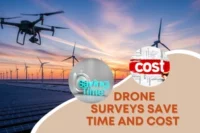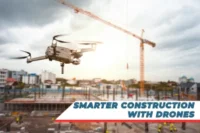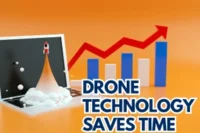How GPS Makes FPV Drone Flying Safer and Smarter
Published: 21 Jul 2025
Did you know that nearly 80% of lost FPV drones never make it back to their owners? That’s a big risk for anyone flying without proper navigation help. That’s where GPS for FPV drone flying steps in. With a GPS module, your drone doesn’t just fly—it remembers where it came from. If the signal drops or the battery runs low, GPS helps guide the drone back safely. Whether you are racing, exploring, or just practicing, GPS gives you peace of mind. It’s a smart upgrade that adds tracking, safety, and stability to your high-speed flights.
What Is GPS for FPV Drones
GPS for FPV drones is like giving your drone a built-in sense of direction. It uses signals from satellites in the sky to figure out where the drone is at all times. The GPS module sits on your drone and talks to the satellites above, sending that location data to your flight controller. This allows the drone to remember where it took off, track its flight path, and even return home if needed. In comparison, non-GPS FPV drones rely only on your manual control and visual line of sight. That means if you lose signal or go too far, there’s no way to bring the drone back automatically. GPS adds an extra layer of safety, especially for long flights or new pilots.
Role of GPS in FPV Flying
GPS plays a big role in how you control and protect your FPV drone. It gives you more freedom, adds safety features, and makes flying smarter and easier, especially when going long distances.
Tracks Real-Time Location : GPS constantly updates your drone’s position as it moves. You always know where it is, even when it’s far away. This is especially useful if you fly beyond your line of sight.
Return to Home (RTH) : Before takeoff, GPS sets a “home point.” If your signal drops or battery runs low, the drone knows where to return and lands safely—no panic, just auto-return.
Safe Flying for Beginners : GPS makes flying less stressful for new pilots. It keeps the drone stable and lets you focus on direction without worrying about drifting or getting lost.
Flight Path Planning : You can program your drone to follow a pre-set route using waypoints. This is great for mapping, surveys, or filming smooth shots across large areas.
Hover in Place : GPS helps the drone stay in one spot when you stop moving the controls. It holds position even in wind, which is helpful for taking photos or capturing videos.
GPS in Emergency Situations
No matter how skilled you are, emergencies can happen mid-flight. GPS gives your FPV drone the ability to respond smartly in these moments, helping you avoid costly mistakes and lost gear.
Signal Loss Protection : If your video feed cuts out or you lose control signal, GPS steps in automatically. The drone uses the saved home point to fly back safely, even if you can’t see or control it. This is a lifesaver when flying far or in areas with signal interference.
Low Battery Auto-Return : When your battery gets too low, GPS works with the drone’s power system to either return to home or land safely nearby. It prevents crashes caused by sudden power loss and helps you avoid losing your drone mid-air.
Crash Recovery Tracking : If your drone crashes or lands unexpectedly, GPS logs the last known location. You can check the coordinates and go straight to where it went down. This feature is especially helpful in large areas or rough terrain—and it can save you from buying a new drone.
Benefits for Different Drone Uses
Not all FPV drones are flown the same way. Some are built for speed, others for tricks, and many for long adventures. No matter your flying style, GPS brings valuable benefits that improve safety, tracking, and flight confidence.
Racing Drones : FPV racing is fast and intense, making it easy to lose track of your drone. GPS helps you monitor location on long or tricky courses. And if a crash happens, it improves your chances of finding and recovering your drone quickly.
Freestyle Drones : When you’re flying creatively, flipping, rolling, or exploring wide spaces, GPS helps keep your drone from getting lost. It’s especially useful in unfamiliar areas or windy conditions, where the drone may drift far from your line of sight.
Long-Range or Explorer Drones : These drones often fly through forests, hills, or even mountain areas. GPS is essential here—it helps track distance, set waypoints, and make sure your drone always knows how to return safely, even if you can’t see it.
Myths About GPS for FPV Drones
Some FPV pilots believe GPS is only for beginners, but that’s not true. In fact, many experienced flyers rely on GPS for safety, tracking, and long-range flights. Another common myth is that GPS modules add too much weight. While that might have been the case in the past, today’s GPS units are small, lightweight, and designed for FPV builds. Lastly, people think GPS is hard to install or configure, but with modern flight controllers and tools like Betaflight or iNAV, setup has become much easier, even for first-time users. Don’t let outdated ideas keep you from using this helpful technology.
Conclusion
Flying an FPV drone is exciting, but it’s even better when you have full control and peace of mind. GPS brings a powerful mix of tracking, safety, and flight stability that makes every flight more reliable. Whether you’re racing through tight tracks, capturing smooth aerial shots, or exploring far-off places, GPS gives you the backup you need when things go wrong. It helps your drone find its way home, saves you from crashes, and even helps you recover it if it goes down. If you haven’t added GPS to your FPV setup yet, now is the time. It’s not just a feature, it’s a smart upgrade for every pilot.
FAQs
No, GPS modules are lightweight and don’t affect flight speed or performance. They’re designed to work with your drone’s flight controller without getting in the way. You still get smooth and fast flights—with added safety.
Yes, GPS logs the last known location of your drone. You can use that data to track it down if it crashes or lands far away. It saves time and helps you avoid losing expensive parts.
Yes, but it depends on how strong the satellite signal is. Open areas work best, but modern GPS modules usually get enough signal even in tough environments. Always check for a good GPS lock before flying.
Not much. GPS modules use very little power, especially compared to motors or cameras. You won’t notice a big difference in flight time.
A GPS module works during flight to guide and stabilize the drone. A tracker is a separate tool you use after a crash to find your drone. GPS gives live flight benefits, while a tracker is more like backup.





